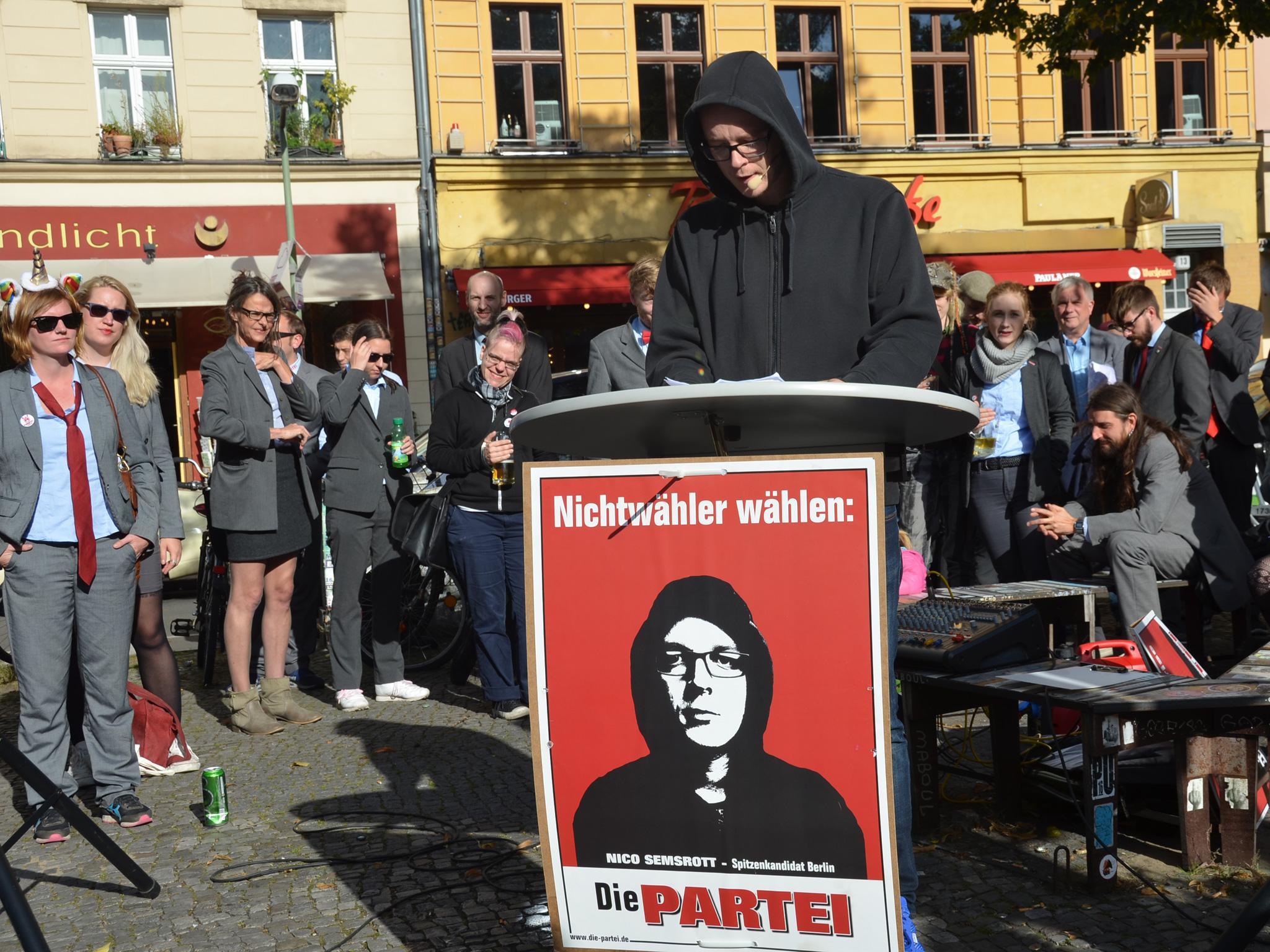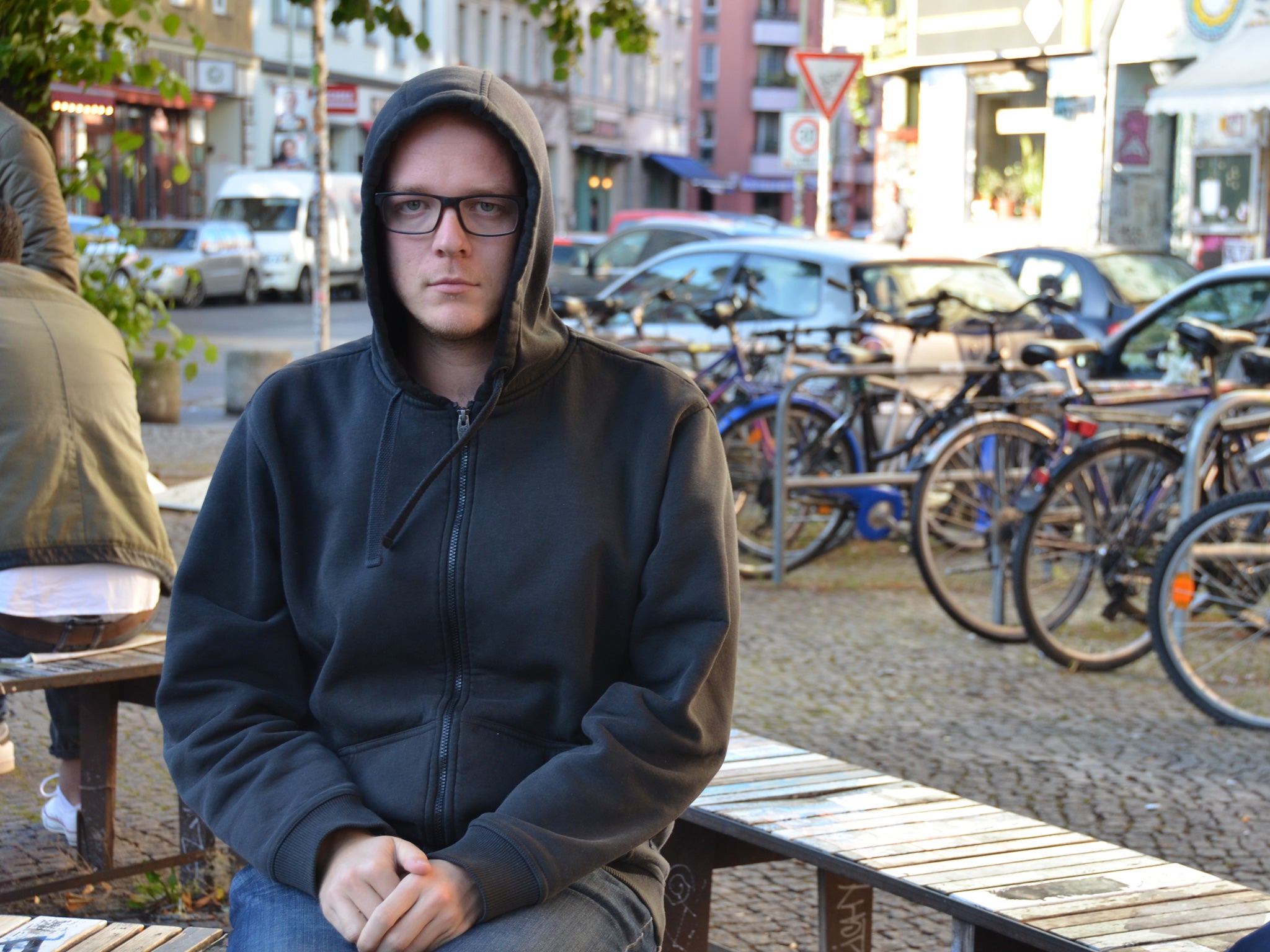German election 2017: Joke party set up to mock broken system now as popular as AfD
‘We are the serious populists, the good ones’

Twelve straight years of Angela Merkel have left politics feeling a little dry for young people in Germany. But now a satirical party is experiencing a surge in popularity after it was set up as a joke at the expense of the old system.
Known simply as “Die Partei” or “The Party”, the group presents itself as promoting both “elites and grassroots” and “labour and the rule of law”, occupying “the extreme centre” while dressing all in dull grey suits in a parody of the absurdity of traditional politicians.
Though its motto is “Yes to politics. No to politics”, Die Partei has capitalised on Germany’s status quo system, which is poised to hand Ms Merkel a fourth term in office in the federal election on 24 September.
Founded by the editors of satirical magazine Titanic, Die Partei started attracting attention in 2014 when one of its members, Martin Sonneborn, was elected to the European Parliament.
In the last few months the party has seen its membership swell to reach more than 25,000, just shy of the 26,000 members of the rising and much-publicised extreme-right party Alternative fur Deutschland (AfD), which is expected to enter parliament for the first time this year.
Speaking to The Independent on the edge of a small rally organised in Kreuzberg, a trendy district at the heart of Berlin that’s home to students, artists and a sizeable Turkish community, local candidate Nico Semsrott said traditional political parties had left a vacuum when it came to mobilising young people.
The 31-year-old slam poet and stand-up comedian said the party’s membership averaged 34 years old, making it potentially “the future in the German political system”.
“If young people from the age of 16 could vote, then Die Partei would get about 20 per cent,” he said. “I believe we can enter the Bundestag [Parliament], maybe not in four years but maybe in eight years.”
As Mr Semsrott takes to the podium accompanied by cheers from his supporters, a few dozen intrigued passers-by stop to listen. They may recognise him from the hooded figure of Die Partei’s Berlin posters, which say he has “given a face” to the crisis of disillusionment in German politics.

After struggling with depression, the 31-year-old candidate started to use dark humour as a tool to capture people’s attention and to act as a safety valve against the AfD.
He told The Independent: “The AfD is built on hate and we are not. Hate and laughter are the exact opposite. We are the serious populists, the good ones.
“I want to be the voice for the intelligent, desperate people. I believe most established parties are just too old and too boring and they are not able to convey a clear message. I mean what do they actually stand for? I don’t really know.”
In the crowd, supporter Ambar de la Horra, 27, described Die Partei as a “mirror” which reflects other parties’ absurdities.
“We can do a lot with humour and provocation. It’s really important to be able to laugh about ourselves and the problems in our country,” she told The Independent.
She added that other mainstream parties were “made by and for old people”, pushing many younger voters to support Die Partei “because they don’t think any other party can represent them”.
Jan Bäcker, 30, had never voted before becoming a member of Die Partei. Now he sees the party as “the only way for me to engage in politics”.
The party’s manifesto makes a mockery of traditional social issues where the old parties have failed to bring about change. On the topic of the gender pay gap, it proposes to end “the fruitless debate” by paying all managers according to their bra size.
“We believe in democracy in its pure, original form,” said Mr Semsrott. “We are disappointed idealists who don’t want to give up on our dreams. Because some of the things we want may be unrealistic, we make fun of it instead of feeling sorry for ourselves.”
Earlier this week, Die Partei made its most shocking play in the election so far, with a campaign poster criticising Chancellor Merkel’s U-turn over accepting refugees in Germany.
The poster echoed Ms Merkel’s feel-good slogan “For a Germany in which we want to live well” by showing a picture of the body of the dead Syrian refugee boy Aylan Kurdi washed up on a beach, alongside the caption “For a beach, where we would gladly lie.”
“Die Partei’s posters make people react,” said Michele Scholtz, a 24-year-old supporter. “People might agree or disagree but at least they make people think about these issues,” she said.
The party’s blurring of parody and policy may present a challenge in the future but, for now, it has enabled Die Partei to field candidates in all of the country’s 16 regions.
“That’s the more serious part,” said Mr Semsrott. “Meanwhile, the party is still quite anarchist in its structure, members are always seen drinking beer and having fun, which is the less serious part.”
Although Die Partei is unlikely to receive more than the 5 per cent threshold needed to win its first seats in Parliament on 24 September, Mr Semsrott insisted: “We would make a great coalition partner with Angela Merkel. She can be our Vice Chancellor.”
Join our commenting forum
Join thought-provoking conversations, follow other Independent readers and see their replies
Comments